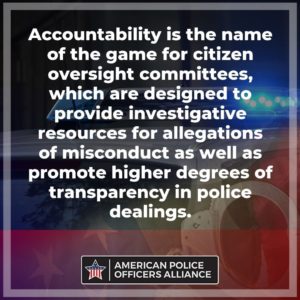When it comes to government and law enforcement, one of the biggest determining factors of trust is transparency. According to a poll conducted among over 10,000 adults in the U.S. by Pew Research Center in 2018, one of the ways that many suggest the government could improve its trust rating is by offering more transparency in its dealings. The same concept can be applied to law enforcement, which is where the origination of citizen oversight committees or police oversight boards began.
Accountability is the name of the game for these committees, which are designed to provide investigative resources for allegations of misconduct as well as promote higher degrees of transparency in police dealings. In many areas, citizen mistrust of police officers is extremely low, which creates tension and clashes. The oversight committees want to help bridge this gap and create a more trusting and safe environment for all involved.
But do these committees actually work? When a group of individuals feel they are being monitored — police officers, in this case — tension can often arise. No one likes to feel as if their actions are being analyzed under a microscope, and this should not be the intention or approach of an oversight committee.

As a benefit to police operations, these committees also serve as a community liaison designed to educate community members about the way police operations work. This level of education is necessary, as many everyday people may not understand the depth that an operation truly goes to.
Oversight boards can also serve to increase the efficiency and effectiveness of police operations, bringing in outside perspective that may be beneficial to those who see the same information day in and day out. Fresh eyes and new perspectives have a lot of benefits in an environment ripe with pressure and, often, tension.
Some will say that these oversight boards do, in fact, work. With only about 150 oversight committees currently in operation around the country, there is a relatively small number of police operations that are actually subject to these committees. However, progress on initiatives such as body cam footage and transparency with misconduct investigations would point to the effectiveness of these oversight boards.
Others will say that such organizations are unnecessarily meddlesome and ineffective. Often, this reasoning is prompted by a lack of funding that the oversight boards contend with or a lack of cohesive relationships that allow for fair proceedings to diffuse tension. Attention must be paid to provide the funding that the boards need to function, and additionally the police jurisdictions these boards monitor must also be willing to take on the feedback provided.
In order for police oversight boards to be effective, there must be a clear understanding of the intention. The benefits of having such boards are numerous, but these committees will only be as effective as the strength of their relationship with the police operations they’re tasked with working with.
As police jurisdictions around the country struggle with everything from racial tensions to lack of funding and support for increased workloads, it’s important that we create as strong of an environment as possible for these officers to ethically do their jobs. Oversight committees are not designed to be a nuisance, but can often go this route with ineffective management. Real, tangible progress can be made if both organizations work together for a common goal.
As more cities across the country adopt police oversight boards, it’s important to know what they are, what they do, and if they are helping civilians feel more confident in their police officers. So, what is police oversight? Learn more here.








